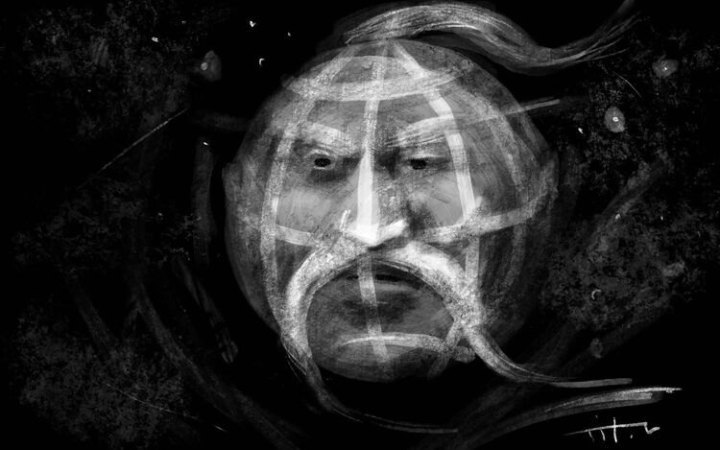‘Good’ and ‘bad’? How should we classify Russians?
Dmytro Zolotukhin: I don't like the idea of calling people who support the Russian opposition and oppose Putin ‘good Russians.’ It is extremely important to give phenomena the right names. However, Ukrainians do not dare to give other people their own definitions. We have not even come up with an adequate name for Russians. The word ‘Russian’ in Ukrainian or English does not convey the original meaning. ‘Russky’ is not a nationality, but a gender and social role.
When we talk about Russians — good or bad — we must first understand what ‘Russians’ are.Probably not many Ukrainians have read the Russian Constitution. Its first article consists of two points: ‘The Russian Federation — Russia is a democratic federal state governed by the rule of law with a republican form of government’ and ‘The names Russian Federation and Russia are equivalent.’ Both statements are false. First, the Russian Federation is not federal, democratic, or governed by the rule of law. Secondly, Russia and the Russian Federation are completely different things. Moreover, if you listen carefully to what Putin says and read the Russian Constitution, you will see that it refers to the ‘multinational people of the Russian Federation’ and not to ‘Russians’. The word ‘Russians’ was invented and popularised by the first president of the Russian Federation, Boris Yeltsin. It is the name of a people that does not exist — like the ‘Soviet people’ who disappeared as soon as the Soviet Union ceased to exist. In addition to ethnic Russians ('russky') there are many peoples in Russia, and although the people who belong to these peoples mostly support Putin, they are not Russians.
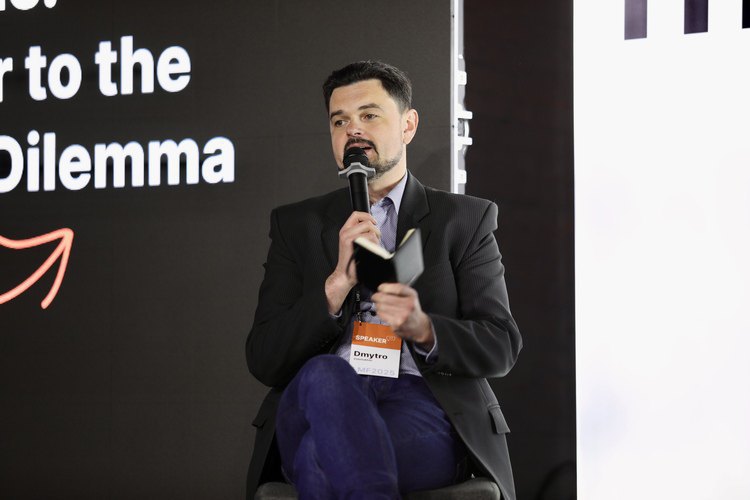
By setting the thematic framework of the discussion ‘what to do with “good Russians”?’, we significantly limit ourselves in self-reflection: who are we and what do we want? We say: ‘good Russians’ exist, we can't do anything about it, so we have to decide how to act towards them, determine whether we like them or not.
In this way, we place ourselves in the classic ‘Karpman triangle’ — a situation where there are three roles in an unhealthy relationship: Victim, Aggressor and Rescuer. And we try to play the role of the victim, sending a signal to various audiences: we need to be rescued. The West plays the role of the rescuer: yes, we want to help you, we want to reconcile you with the aggressor, discuss and heal your relationship with him.
At the same time, non-Putin Russians say: we understand that Ukrainians are traumatised and emotionally unstable, but we are also victims. We are Putin's victims! And we will compete with Ukrainians for the role of victim, because it is us who need to be saved. And the Saviour agrees: of course, you are also victims, and we will divide resources between Ukrainians and Russians.
To solve this problem, we need to go beyond the ‘Karpman triangle’ and stop competing with Russians for the role of victim. Instead, we need to choose another role — for example, that of a psychiatrist. All right, if Russians are victims, we will help them stop being victims. We are ready to tell them how to do it. We have a lot of experience: we last did this in 2014. And if they refuse our advice, that's their problem.
Oleksandra Romantsova: I represent the Centre for Civil Liberties, an organisation that was awarded the 2022 Nobel Peace Prize together with a Russian human rights organisation and a Belarusian dissident. And the fact that we received the prize together with the Russians was remembered by many Ukrainians more than the fact that the Nobel Prize was awarded to Ukrainians.
I know about two thousand human rights defenders who are connected to Russia in various ways: some still live there, others were forced to leave the country, and some changed their citizenship but remain part of the Russian and Russian-speaking community. Since 2014, these people have been helping us document Russia's war crimes in regions where we do not have access. This is not even a minority in society, but simply a small group of people who feel responsible for their country's actions and believe in human dignity. I am proud to work with these people and organisations, and every time we communicate, we have no differences of opinion. They know that Putin is a criminal, that Russia committed a crime by invading Crimea, Donetsk and Luhansk regions. Some of them ended up behind bars because they voiced their political position condemning the war.
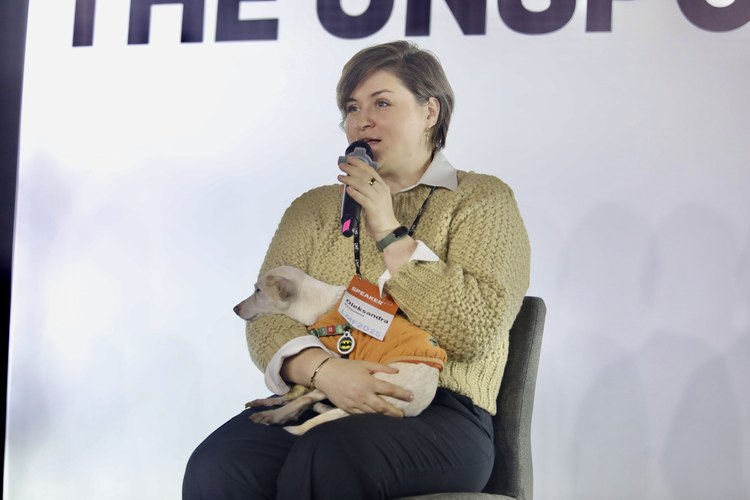
There are volunteers in Russia who help Ukrainians leave and get to Ukraine. There are lawyers who try to defend those who have been unjustly accused in court. I don't like the generalisation of ‘good Russians’ because all these cases are manifestations of personal responsibility.
When I talk to someone and realise that they are Russian or connected to Russia, I ask a few questions. Is this person “against the war” or are they in favour of Ukraine’s victory? If they are in favour of victory, are they doing anything to achieve it? Have they simply put a black square on their Instagram avatar, or are they involved in one of the many grassroots initiatives that in various ways help war victims or contribute to Ukraine’s victory? This can be done in Russia, in Ukraine — where Russians can help rebuild homes destroyed by the war — or in other countries where Ukrainians are forced to flee Russian aggression. Perhaps this person is a hacker helping the Ukrainian cyber security system? Is this person willing to pay taxes, from which Ukraine will receive reparations after the war ends? And is this person willing to acknowledge at least partial responsibility for Ukraine's victory and the end of the war? The answers to these questions help me understand whether I am dealing with a person or just a cog in the Russian machine.
I am grateful for the triangle model described by Dmytro, because the best way to get out of this triangle is not to be a victim, aggressor or saviour, but to behave as partners. Partners who have their own goals, know the goals of the other side and respect them in this relationship. Once I have answers to my questions, I can decide whether to talk to the person as an enemy or as a partner.
Valeriy Pekar: We have been discussing this topic for so many years because we cannot approach it pragmatically, but only emotionally. We talk about how we feel and cannot formulate what we want.
First and foremost, we want lasting peace. Neither surrender nor partial victory will bring us there. Lasting peace is only possible when the threat to Ukraine from Russia no longer exists. The trial and prosecution of Putin and other Russians — bad, good or otherwise — can only happen in a situation of lasting peace.
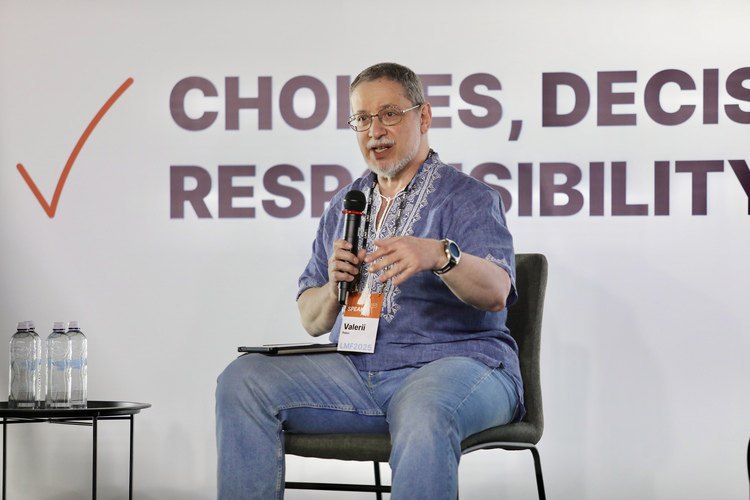
So the question of whether certain Russians are ready to take responsibility is misguided: it is not they who will decide whether to take responsibility, but international organisations. My key question to Russians is: are you imperialists or not? And there is no ‘correct’ answer to the question ‘who does Crimea belong to?’ Because there is another question: whose is Kazan? Whose is Lake Baikal? And so on. We want Russians to become anti-imperialists and anti-colonialists. The de-imperialisation and decolonisation of the so-called Russian Federation is the key to democracy. Russian imperialists are our enemies. Ukrainian philosopher Vakhtang Kebuladze says that they are even worse than Putin, because Putin is our enemy today, while Russian imperialists are our enemy tomorrow.
And there is no need to divide Russians into ‘good’ and ‘bad’; there are useful Russians and useless Russians. The useful ones are those who bring us closer to victory and lasting peace. The useless ones are those who push us further away. All the others, who are the majority, can be considered neutral Russians.
How can we find useful Russians? Perhaps we should start looking among those who are not Russians.
This is a scenario analysis of Russia's future. Imagine that the bottom line does not exist; this is the false dichotomy that exists in the vision of Western analysts. There are only two possible scenarios: consolidation of the empire and intensification of the war (possibly the use of nuclear weapons or attacks on new countries) or chaotic disintegration with dire consequences for the whole world. Both are bad for the West and for Ukraine. This is the trap of Moscow-centrism. They look at Moscow and try to understand what will happen to Russia. Meanwhile, strategic theory teaches us that if all scenarios are bad, it means that someone is shaping your vision in a way that hides the positive scenarios. Let's broaden our vision and see other scenarios: first, refederalisation and the creation of a new state (the Russian Empire did this twice, in 1917 and 1991). Second, a controlled division of the empire into new independent states. This option is best for us, and the people who can implement it, regional and national leaders, are useful to us.
Should we participate in events where Russians are present?
Valeriy Pekar: We must be present on all platforms where Russians are present — whether they are ‘good,’ ‘bad,’ or anything else. We must not leave them alone with foreign audiences. We need to go there, even if it makes us feel uncomfortable. But we should not go there to argue with Russians, but to promote our vision and voice our narrative.
For example, we talk to Americans: okay, let's discuss the national security of the United States. Did you know that it is not Greenland, but the Republic of Sakha that is the key to US national security? Oh, you don't know what the Republic of Sakha is? Read about it on Wikipedia and see for yourself.
Dmytro said that ‘Russky’ is a gender; I would say that it is a diagnosis, because gender can be changed, but a diagnosis can be cured. We will see a parade of new identities in territories that are now considered ethnically Russian. Urals, Siberians, Ingrians. We must encourage these people to find their new identity and oppose Russian imperialism and colonialism while our military turns ‘bad’ Russians into ‘good’ ones — you understand what I mean.
Dmytro Zolotukhin: The key principle in wartime is ‘friend or foe.’ This means that when you see a person, you have to figure out whether they are your enemy (and then shoot them) or your friend (and then interact with them). Since the start of the full-scale war, we have not made enough effort to define the criteria by which we distinguish friends from enemies. I consider anyone who acts in a way that brings me closer to achieving my goals to be a friend. However, Yuliya Navalnaya, Mikhayil Khodorkovskyy, and most Russians who call themselves the opposition do not act in a way that is beneficial to Ukraine, so unfortunately, they cannot be considered friends of Ukraine.
Do we need to compete with non-Putin Russians?
Valeriy Pekar: If we try to compete with Russians in the same sport, we will lose. There are more Russians than Ukrainians; there are more Russians than Ukrainians abroad; Russians have more money, media and access to countries over which Ukraine has no influence. But we are not obliged to compete in the same sport. Let's choose different ones. This does not mean that a runner has to beat a boxer, or a boxer has to catch up with a runner. Runners and boxers compete on different stages at the Olympic Games — for attention.
It's the same as on the battlefield: when we wage a symmetrical war, we lose. And we win when we come up with a way to wage an asymmetrical war that is advantageous to us. One missile was enough for the cruiser Moskva, a few drones — for Russian planes. We must find a way to promote our interests and narratives without competing directly.
Do we need to seek the ‘abolition’ of Russian culture in the world?
Dmytro Zolotukhin: Russia is attacking Ukrainian identity. And this war will continue and will not stop, no matter what ceasefire agreements the parties conclude, until either Ukrainian identity or Russia's imperial form disappears.
The Russian Federation has demonstrated its ability to weaponise (turn into a weapon) anything it touches. History, dance, songs, Eurovision, Pushkin, Nabokov, Tolstoy... These are weapons that Russia uses in all spheres, on all platforms. Our attempts to ‘abolish’ Russian culture are not actually directed against culture, but against the weapon that culture has been turned into.
Oleksandra Romantsova: Fighting against Russian culture in the world is a waste of time. We want our Western partners not to perceive Russia as the centre of our region, but we ourselves are doing just that — putting Russia at the centre of our world. Yes, we must be present in all places that are important to us, including those where Russians traditionally work. We will not need to cancel the Russian opera Eugene Onegin at the London Opera if the performance of You Are Romantica by MUR is a huge success there and in every opera house in Europe.
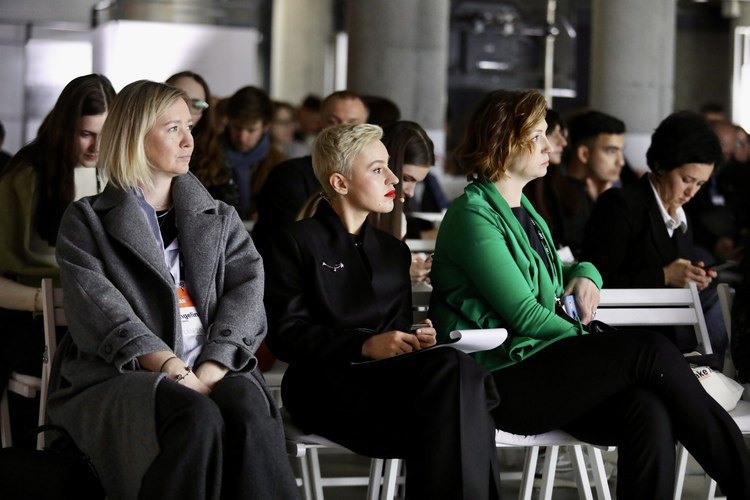
The legend of the greatness of Russian/Soviet culture is still alive in the world. Russians who are capable of reflection — and there are not many of them — understand that the cultural construct currently used by Putin, and previously used by the Soviet Union, has destroyed much that is truly Russian. And most of the truly great artists who created this culture were either destroyed or persecuted by the Russian state during their lifetime. So it is useful for us to emphasise that these great artists were great not because of imperial Russia, but rather in spite of it.
Valeriy Pekar: The ‘abolition’ of Russian culture gives us nothing but fleeting emotional satisfaction. It's pleasant, but it can be achieved in other ways — for example, by eating a pie.
How should we deal with Russian media operating in exile?
Oleksandra Romantsova: I think that sometimes we expect too much from Russian-language non-Putin media. We don't explain to them what the problem is, how exactly they are voicing imperialist narratives. Some of them may take feedback into account and change their actions. I think it's worth a try. There are many Russians who want to do something against Putin, but it is important for us that their actions are not only against Putin, but also beneficial to us.
Valeriy Pekar: Russian media in exile can be useful if they fight against Russian colonialism and imperialism. Fight with words, as journalists can do.
Dmytro Zolotukhin: Let's invite the editors of these media outlets to move, for example, to Kharkiv or Sumy. I guarantee that after that, they will change their perspective and rhetoric on covering the war.
Should we seek collective responsibility of all Russians for the aggression against Ukraine?
Oleksandra Romantsova: Personal responsibility is needed. For example, Ukraine is now demanding the introduction of personal sanctions against the heads of every prison in Russia or in the Ukrainian territories occupied by Russia where Ukrainian hostages are being held.
Valeriy Pekar: Criminal responsibility can only be personal. The term ‘criminal nation’ was invented by Stalin to repress the Crimean Tatars, Chechens and other peoples.
Moral responsibility can be collective, but it is not easy to develop principles and mechanisms for its application. Should we ask Russians to accept moral responsibility? This is counterproductive. Moral responsibility can only come about in a stable peace. It requires deep internal work, a transformation that most people are not ready for. It takes time — in the case of Germany, it took a whole generation to accept moral responsibility for the crimes of Nazism. For many, it will be easier to change their identity than to take responsibility. They will say, ‘This is a war that Russia started, but we are not Russians!’
Dmytro Zolotukhin: There is a big difference between guilt and responsibility. The word ‘guilt’ means that there was a trial, a verdict, and a person must be punished. ‘Responsibility’ is when every resident of Russia understands that part of the taxes they pay to the Russian budget goes to the restoration of Ukraine. And this is necessary to correct the mistakes of the previous leadership of his country.
At the same time, in addition to the responsibility of Russians for the aggression against Ukraine, I consider it useful to talk about compensation for those Russians who have suffered for supporting Ukraine. People like the girl who quoted Shevchenko in court. But I'm not talking about the ‘Oscar’ that Yuliya Navalnaya is getting just for being Yuliya Navalnaya. The reward should go to those who suffered in the fight against imperial Russia.
The discussion took place as part of the Lviv Media Forum 2025.









